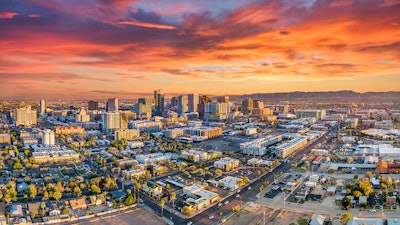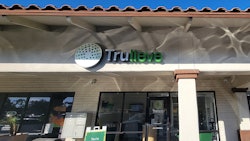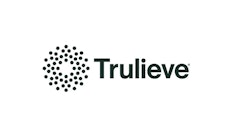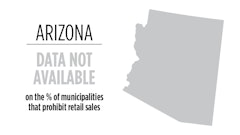
Four of Arizona’s 26 social equity dispensary licenses are reportedly being used as “placeholders” for forthcoming dispensaries, despite an Oct. 8 deadline for retail licensees to open their storefronts or risk the opportunity to open at all.
Arizona officials issued the highly sought-after licenses in April 2022, after the dust settled around a lawsuit challenging the licensing requirements. The plaintiffs argued that the state’s rules governing the social equity licenses were deficient, lacking provisions such as a ban on license transfers and a requirement that licensees’ expenditures and profits remain in their communities.
The lawsuit was ultimately dismissed in February 2022, however, paving the way for regulators to issue the licenses, which were reserved for applicants most severely impacted by the war on drugs.
RELATED: What’s Next for Social Equity in Arizona’s Cannabis Market?
The Arizona Department of Health Services (ADHS) created the requirements for the social equity licenses, which were outlined in Proposition 207, the adult-use legalization measure voters approved in the November 2020 election.
Regulators ultimately decided that the licenses would be awarded to applicants who met three of four qualifying criteria, which focused on household income, adverse impacts from prohibition and residency requirements. ADHS subsequently announced that applicants who had recently lived in one of 87 qualifying ZIP codes would meet the residency criteria for the licenses.
Regulators received more than 1,500 applications for the 26 licenses, which were ultimately awarded April 8, 2022, in a randomized lottery drawing.
RELATED: Arizona Reveals Potential Odds to Win Social Equity License
Four of the 26 social equity licenses were later acquired by Guadalupe-based Mint Cannabis, which also operates dispensaries in Michigan and Missouri, according to The Arizona Republic, which first reported the news.
While the terms of the deals Mint made with the four original license holders have not been made public, co-owner Raul Molina told The Arizona Republic that the licensees were “well taken care of financially” when Mint took control of the licenses.
Molina told the news outlet that the four licenses are being used to operate dispensaries in a temporary location; the dispensaries are “placeholders” to meet the state’s Oct. 8 opening deadline while the company works on building out permanent locations, he said.
The Arizona Republic paints a vivid picture of what these dispensaries look like; according to the news outlet, all four storefronts are located inside a single business complex in El Mirage, Ariz. A large “Cannabis Outlet” sign is displayed outside, on one corner of the strip mall, which also houses a chiropractic office and medical clinic.
Inside a single suite within the building are doors to the four dispensaries; one is labeled Cannabis Outlet, while the others display the names of the limited liability corporations that initially applied for and won the licenses: MCD-SE Venture 25, MCD-SE Venture 26 and Blue Palo Verde.
The hours of operation listed on each door are 8:30 a.m. to 5:30 p.m., Monday through Thursday. Once operational, dispensaries are required by law to be open a minimum of 30 hours per week, and Molina told The Arizona Republic that the posted hours were established “to fill out the minimal hours that the state requires until we get [the dispensaries] to their final resting home.”
However, the news outlet reported that at roughly 9 a.m. on Monday, the interior doors to all four dispensaries were closed and, inside the unfurnished suite, a single employee sitting behind a table told visitors that the store was closed and may not open for up to a year.
Molina told The Arizona Republic he was “surprised” the dispensaries were not open and reiterated that they should be open according to the posted hours. He said he would ensure the stores were open by the next day.
Molina expects the dispensaries to be relocated within the next four to eight months to their permanent locations, The Arizona Republic reported, but in the meantime, the current locations are only meant to keep the licenses active. The stores are not advertised or promoted by Mint.
The company worked with ADHS to receive regulatory approval to open the four locations, Molina told the Arizona Republic, and he said the temporary locations are meant to “make sure I had all the time that I needed” to meet regulatory requirements.
"We're doing the best we can," Molina told the news outlet. "The state knows my intention of where I'm going with these licenses."
The El Mirage business complex is also on board; the Arizona Republic reported that El Mirage approved the arrangement and a city spokeswoman noted, "The marijuana dispensaries are permitted at that location, which is an urban corridor, and we don't have distance restrictions as long as they comply with county, health and state regulations.”
Despite the vision behind Arizona’s social equity licensing program, corporate entities now control 25 of the 26 licenses, according to a separate report from The Arizona Republic.
Efforts by activists and several license applicants led to lawmakers introducing a bill this year to investigate cases of alleged predatory license acquisitions, according to the news outlet. The legislation would ultimately return control or ownership of improperly obtained licenses to the original license winners.
Meanwhile, Molina told The Arizona Republic that he expects Mint’s four retail locations to become some of the state’s top-performing dispensaries once they are relocated to their permanent homes.
"You'd be hard-pressed to find too many people that have something bad to say about us," he said. "And for sure, if somebody does, you know, we try to do the best we can to remedy everything."























